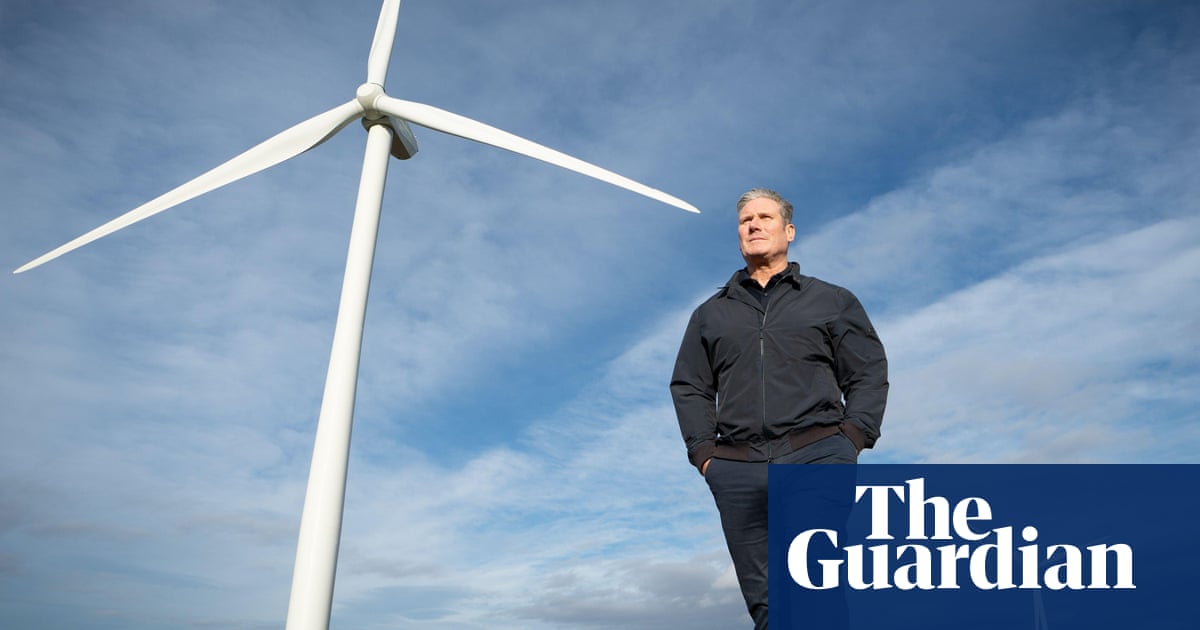The UK can reach its net zero targets for 2050, and its interim carbon budgets for 2030 and beyond, the government’s statutory climate advisers have reported, in an unusual vote of confidence in green policy.
But difficult decisions cannot be ducked, the Climate Change Committee (CCC) added in its annual progress report to parliament – including a pressing need to overhaul the way energy is taxed in order to make electricity much cheaper than gas.
Piers Forster, chair of the CCC, said: “This is an optimistic report. It is possible to meet our carbon budgets for 2030 and 2050, provided we take steps forward [on policy]. It’s very important that our country steps up to deliver our commitments.”
The longstanding net zero target,put in place by the Conservative prime minister Theresa May in 2019, has come under sustained attack in recent weeksfrom Tory leader Kemi Badenochand from the Reform party.
Badenoch has repeatedly called net zero “impossible” and earlier this month called for the repeal of the windfall tax on oil and gas production in the North Sea.
Reform’s deputy leader, Richard Tice, has called the target “net stupid zero” and told the Guardianhe believed Labour would quietly back down on the issue.
Forster said the CCC had found that reaching net zero would not destroy the UK’s economy, contrary to some claims. “We think it will be beneficial to our economy – not instantly, but by the seventh carbon budget [from 2038] the economy will be receiving significant benefits, and we expect that to continue [to 2050],” he said, referring to previous research ahead of the assessment report published on Wednesday.
The optimistic tone of this year’s CCC progress report also stood in stark contrast to recent years, which have tended to find that government policy was way off track.
A series of decisions taken by Labour in the past year, includinglifting the ban on onshore windfarmsand boosting offshore wind, have brought the UK closer to the policy framework needed to reach net zero. Some policies of the previous government are also paying offin higher uptake of heat pumpsand electric vehicles, though these are still not happening fast enough, the CCC warned.
The biggest gap identified by the CCC concerns the pricing of energy. The UK’s high electricity costs are mostly owing to reliance on volatile global gas prices, but bills are made yet steeper by levies that support renewable energy and other low-carbon efforts. These disproportionately affect electricity bills, rather than gas bills, helping to make electricity artificially more expensive compared with gas.
This is problematic, as switching from gas to electricity for heating, transport, industry and other purposes is vital to meeting climate targets. It also counteracts the impact of renewable energy, which should be bringing bills down.
But the options for shifting the costs are unpalatable: the levies could be added to general taxation, which would mean the chancellor, Rachel Reeves, increasing the tax take; or they could be shifted to gas bills, which could disadvantage vulnerable people if social protections were not built into the system.
Sign up toDown to Earth
The planet's most important stories. Get all the week's environment news - the good, the bad and the essential
after newsletter promotion
The Institute for Fiscal Studies (IFS), an independent thinktank, has found that placing more taxes on the UK’s electricity than gas means businesses are taxed £249 for every tonne of carbon produced by their business activities if it comes from electricity and just £52 if it comes from gas.
“If the government wants to help households and firms with the costs of net zero, rethinking these taxes on electricity would be a good first step, according to Bobbie Upton, a research economist at the IFS. This could mean sharing more of the costs with gas bills.
Tackling Britain’s eye-watering energy costs wasa centrepiece of the government’s industrial strategy earlier this week, which promised to cut the levies faced by thousands of energy-intensive companies from 2027 to help improve economic growth.
In further good news, the CCC found that tree planting had surged, particularly in Scotland, to levels not seen since the 1990s. This is not yet enough – tree planting must recover to the levels last seen in the 1970s – to meet the government’s targets, but is a marked improvement on recent trends.
The government is also facing a key test of its net zero plans: in response to legal action brought by Friends of the Earth, ministers must publish this October a comprehensive national plan showing how they intend to meet the net zero targets.
Mike Childs, head of policy at Friends of the Earth, said: “[That plan must be] designed in a way that’s fair, so that we can bring everyone along with us in building a better future. That means ensuring polluters – not hard-working people and the most marginalised in our society – are the ones picking up the tab for climate action.”
